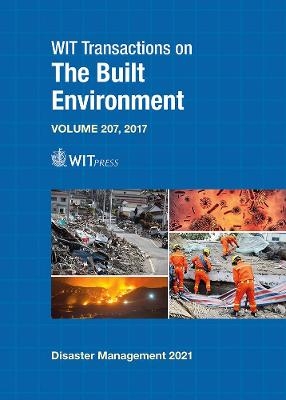
Disaster Management and Human Health Risk VII
WIT Press (Verlag)
978-1-78466-445-9 (ISBN)
Research presented at the 7th International Conference on Disaster Management and Human Health: Reducing Risk, Improving Outcomes is contained in this volume. These contributions from academics and experts focus on public health, security and disaster management with the goal to assess the potential risk from various types of disaster and highlight ways to prevent or alleviate any damage.
There is a need for academia and practitioners to exchange knowledge and experience on the way to handle the increasing risk of natural and human-made disasters. Recent major earthquakes, tsunamis, hurricanes, floods and other natural phenomena have resulted in huge losses in terms of human life and property destruction. A new range of human-made disasters have afflicted humanity in modern times; terrorist activities have been added to more classical disasters such as those due to the failure of industrial installations for instance.
It is important to understand the nature of these global risks to be able to develop strategies to prepare for these events and plan effective responses in terms of disaster management and the associated human health impacts.
The papers included in this volume cover such topics as Public health risk; Socio-economic issues; Environmental issues; Emergency preparedness and risk mitigation.
Section 1: Public health risk
Reducing community vulnerability in Pacific Islands Forum countries: Lessons from a pandemic; Effectiveness of government responses and the role of national culture
in addressing the COVID-19 pandemic: A global perspective; Building resilient coalitions: Health and medical response through COVID-19 concurrent events; Institutions of higher education in COVID-19 risk communications: Texas study; “Seductive attraction” of “apocalyptic desire”: Panic, trauma news, and pathogen armeggedons
Section 2: Socio-economic issues
Role of awareness to prevent personal disasters: Reducing the risks of falling for phishing by strengthening user awareness; Coastal socio-ecological system assessment in municipalities: System dynamics modelling application in Latvia; Social crisis, protests and effects on public emergency services: Econometric analysis of the Chilean social outbreak;
Economic risks facing Afghanistan: Failed states and bureaucratic resistance
Section 3: Environmental issues
Environmental remediation and possible use of terrestrial microbial fuel cells; Water pollution threatening marine, coastal and estuarine systems: A review of environmental-economic approaches for the assessment of development strategies
Section 4: Emergency preparedness and risk mitigation
Role of community-led planning for effective wide-area regional evacuation; Spatial relationship between placement of shrines and risk of flooding in low-lying areas at the eastern Tokyo Metropolitan region; Criterion-referenced assessment index for evaluating social wellbeing in flood relief camps; Development of a disaster risk profile in the public healthcare system during flood situation: A case study of Nakhon Sawan city municipality,
Nakhon Sawan Province, Thailand; Proposed flood reaction model followed by the evacuation of the population in V4 countries; Reviewing seismic vulnerability dimensions:
Current trends and methodological challenges; Experimental study for retaining walls using pile countermeasure against earthquakes; Semi-quantitative methodology for disaster risk assessment: The case study of Pipus village, Amazonas department, Peru
| Erscheinungsdatum | 19.01.2022 |
|---|---|
| Reihe/Serie | WIT Transactions on The Built Environment ; 207 |
| Verlagsort | Southampton |
| Sprache | englisch |
| Maße | 178 x 254 mm |
| Themenwelt | Naturwissenschaften ► Biologie ► Ökologie / Naturschutz |
| Wirtschaft ► Betriebswirtschaft / Management ► Allgemeines / Lexika | |
| ISBN-10 | 1-78466-445-6 / 1784664456 |
| ISBN-13 | 978-1-78466-445-9 / 9781784664459 |
| Zustand | Neuware |
| Informationen gemäß Produktsicherheitsverordnung (GPSR) | |
| Haben Sie eine Frage zum Produkt? |
aus dem Bereich


